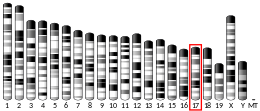Leukocyte-specific transcript 1 protein is a protein that in humans is encoded by the LST1 gene.[5][6][7]
References
edit- ^ a b c ENSG00000226182, ENSG00000231048, ENSG00000204482, ENSG00000206433, ENSG00000223465, ENSG00000234514, ENSG00000235915 GRCh38: Ensembl release 89: ENSG00000230791, ENSG00000226182, ENSG00000231048, ENSG00000204482, ENSG00000206433, ENSG00000223465, ENSG00000234514, ENSG00000235915 – Ensembl, May 2017
- ^ a b c GRCm38: Ensembl release 89: ENSMUSG00000073412 – Ensembl, May 2017
- ^ "Human PubMed Reference:". National Center for Biotechnology Information, U.S. National Library of Medicine.
- ^ "Mouse PubMed Reference:". National Center for Biotechnology Information, U.S. National Library of Medicine.
- ^ Nalabolu SR, Shukla H, Nallur G, Parimoo S, Weissman SM (Mar 1997). "Genes in a 220-kb region spanning the TNF cluster in human MHC". Genomics. 31 (2): 215–22. doi:10.1006/geno.1996.0034. PMID 8824804.
- ^ de Baey A, Fellerhoff B, Maier S, Martinozzi S, Weidle U, Weiss EH (Jan 1998). "Complex expression pattern of the TNF region gene LST1 through differential regulation, initiation, and alternative splicing". Genomics. 45 (3): 591–600. doi:10.1006/geno.1997.4963. PMID 9367684.
- ^ "Entrez Gene: LST1 leukocyte specific transcript 1".
Further reading
edit- Abraham LJ, Grimsley G, Zhang WJ, et al. (1992). "Polymorphism in the human B144 gene in different MHC haplotypes". Eur. J. Immunogenet. 19 (3): 165–8. doi:10.1111/j.1744-313X.1992.tb00055.x. PMID 1352700. S2CID 28280986.
- Holzinger I, de Baey A, Messer G, et al. (1995). "Cloning and genomic characterization of LST1: a new gene in the human TNF region". Immunogenetics. 42 (5): 315–22. doi:10.1007/BF00179392. PMID 7590964. S2CID 19916860.
- Pende D, Parolini S, Pessino A, et al. (1999). "Identification and Molecular Characterization of Nkp30, a Novel Triggering Receptor Involved in Natural Cytotoxicity Mediated by Human Natural Killer Cells". J. Exp. Med. 190 (10): 1505–16. doi:10.1084/jem.190.10.1505. PMC 2195691. PMID 10562324.
- Neville MJ, Campbell RD (2000). "Alternative splicing of the LST-1 gene located in the Major Histocompatibility Complex on human chromosome 6". DNA Seq. 8 (3): 155–60. doi:10.3109/10425179709034067. PMID 10668961.
- Rollinger-Holzinger I, Eibl B, Pauly M, et al. (2000). "LST1: a gene with extensive alternative splicing and immunomodulatory function". J. Immunol. 164 (6): 3169–76. doi:10.4049/jimmunol.164.6.3169. PMID 10706707.
- Yu X, Weissman SM (2000). "Characterization of the promoter of human leukocyte-specific transcript 1. A small gene with a complex pattern of alternative transcripts". J. Biol. Chem. 275 (44): 34597–608. doi:10.1074/jbc.M004700200. PMID 10944527.
- Raghunathan A, Sivakamasundari R, Wolenski J, et al. (2001). "Functional analysis of B144/LST1: a gene in the tumor necrosis factor cluster that induces formation of long filopodia in eukaryotic cells". Exp. Cell Res. 268 (2): 230–44. doi:10.1006/excr.2001.5290. PMID 11478849.
- Ferlazzo G, Tsang ML, Moretta L, et al. (2002). "Human Dendritic Cells Activate Resting Natural Killer (NK) Cells and Are Recognized via the NKp30 Receptor by Activated NK Cells". J. Exp. Med. 195 (3): 343–51. doi:10.1084/jem.20011149. PMC 2193591. PMID 11828009.
- Strausberg RL, Feingold EA, Grouse LH, et al. (2003). "Generation and initial analysis of more than 15,000 full-length human and mouse cDNA sequences". Proc. Natl. Acad. Sci. U.S.A. 99 (26): 16899–903. Bibcode:2002PNAS...9916899M. doi:10.1073/pnas.242603899. PMC 139241. PMID 12477932.
- Castriconi R, Cantoni C, Della Chiesa M, et al. (2003). "Transforming growth factor β1 inhibits expression of NKp30 and NKG2D receptors: Consequences for the NK-mediated killing of dendritic cells". Proc. Natl. Acad. Sci. U.S.A. 100 (7): 4120–5. Bibcode:2003PNAS..100.4120C. doi:10.1073/pnas.0730640100. PMC 153058. PMID 12646700.
- Mungall AJ, Palmer SA, Sims SK, et al. (2003). "The DNA sequence and analysis of human chromosome 6". Nature. 425 (6960): 805–11. Bibcode:2003Natur.425..805M. doi:10.1038/nature02055. PMID 14574404.
- Xie T, Rowen L, Aguado B, et al. (2004). "Analysis of the Gene-Dense Major Histocompatibility Complex Class III Region and Its Comparison to Mouse". Genome Res. 13 (12): 2621–36. doi:10.1101/gr.1736803. PMC 403804. PMID 14656967.
- Lehner B, Semple JI, Brown SE, et al. (2004). "Analysis of a high-throughput yeast two-hybrid system and its use to predict the function of intracellular proteins encoded within the human MHC class III region". Genomics. 83 (1): 153–67. doi:10.1016/S0888-7543(03)00235-0. PMID 14667819.
- Harrison RE, Sikorski BA, Jongstra J (2005). "Leukocyte-specific protein 1 targets the ERK/MAP kinase scaffold protein KSR and MEK1 and ERK2 to the actin cytoskeleton". J. Cell Sci. 117 (Pt 10): 2151–7. doi:10.1242/jcs.00955. PMID 15090600.
- Marafioti T, Mancini C, Ascani S, et al. (2006). "Leukocyte-specific phosphoprotein-1 and PU.1: two useful markers for distinguishing T-cell-rich B-cell lymphoma from lymphocyte-predominant Hodgkin's disease". Haematologica. 89 (8): 957–64. PMID 15339679.
- Mulcahy H, O'Rourke KP, Adams C, et al. (2006). "LST1 and NCR3 expression in autoimmune inflammation and in response to IFN-gamma, LPS and microbial infection". Immunogenetics. 57 (12): 893–903. doi:10.1007/s00251-005-0057-2. PMID 16362817. S2CID 1615261.






